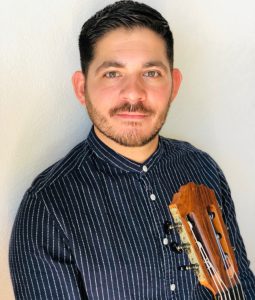MT in Forensic Psychiatric Setting
 Our MT-BC colleagues Tara Brinkman and Steven Franco work at Department of State Hospitals- Atascadero , a maximum security forensic hospital. Some of the patients are awaiting court proceedings, and some were determined not guilty by reason of insanity, but a large portion of the population have been convicted of violent felonies. Both therapists work with various groups and individuals in the forensic hospital, but in this podcast they talk about a centralized group called REACH-Music. Tara and Steven overview the structure of the REACH-Music group and some of the research behind their work with these clients. They describe numerous music therapy interventions which address goal areas such as emotional intelligence, mental health management, grounding, and social skills. This AMTA-Pro podcast also includes information about the importance of building a therapeutic alliance and other safety tips.
Our MT-BC colleagues Tara Brinkman and Steven Franco work at Department of State Hospitals- Atascadero , a maximum security forensic hospital. Some of the patients are awaiting court proceedings, and some were determined not guilty by reason of insanity, but a large portion of the population have been convicted of violent felonies. Both therapists work with various groups and individuals in the forensic hospital, but in this podcast they talk about a centralized group called REACH-Music. Tara and Steven overview the structure of the REACH-Music group and some of the research behind their work with these clients. They describe numerous music therapy interventions which address goal areas such as emotional intelligence, mental health management, grounding, and social skills. This AMTA-Pro podcast also includes information about the importance of building a therapeutic alliance and other safety tips.
[display_podcast]
MT in Forensic Psychiatric Setting
AMTA-Pro Podcast ~ May, 2020
Tara Brinkman, MT-BC and Steven Franco, MA, MT-BC
— + —
Overview of AMTA-Pro podcast
MT-BCs Tara Brinkman and Steven Franco work at Department of State Hospitals- Atascadero (formerly known as Atascadero State Hospital), a maximum security forensic hospital located in Atascadero, CA. It has over 1,100 beds and houses male patients committed under a variety of penal codes. Some of the patients are awaiting court proceedings, and some were determined not guilty by reason of insanity, but a large portion of the population have been convicted of violent felonies.
Patients are housed on residential units and assigned a rehabilitation therapist on the team (art, music, or recreation). Teams assess the patients and refer them to groups both on the unit and in centralized locations. There is a level system in which patients can access different locations in the hospital as long as they are deemed safe to do so. Patients can choose whether or not they would like to attend groups.
REACH stands for Recovery Education Activities for Community Health. It is a program designed specifically for challenging patients who are not responding well to traditional didactic groups due to a combination of mental illness, forensic issues, and cognitive limitations. The REACH program has a groups which focus on various skills, e.g., emotion management, mental health, fitness, art, substance abuse, cognition, and discharge preparation. The group discussed in this podcast is a centralized group called REACH-Music. The REACH-Music group is facilitated by two music therapists and utilizes a variety of music therapy interventions to address goal areas such as emotional intelligence, mental health management, grounding, and social skills.
The structure of the REACH-Music group and some of the research behind the interventions are discussed in the podcast. The importance of building a therapeutic alliance and other safety tips are also reviewed.
Feel free to contact Steven at [email protected] or Tara at [email protected] with any questions or comments.
AMTA-Pro Podcast Discussion Outline
1. Introduction of speakers
2. Information about the Department of State Hospital – Atascadero
3. Description of the REACH program
5. Overview of music therapy and schizophrenia
6. Introduction of two patients in the Music Therapy REACH group
7. Information about the structure of the music therapy session structure
8. Details about the structure of the music therapy REACH group
9. Description of some of the music therapy interventions for the REACH group
9. Information about documentation
10. Details about modifications, therapeutic strategies, and safety tips
11. Discussion of therapeutic alliances
References
Frajo-Apor, B., Pardeller, S., Kemmler, G., Welte, A.-S., & Hofer, A. (2016). Emotional Intelligence deficits in schizophrenia: The impact of non-social cognition. Schizophrenia Research, 172(1-3), 131–136. doi: 10.1016/j.schres.2016.02.027
Gabrielsson, A. (2010). Strong experiences with music. In P. N. Juslin, & J. A. Slo- boda (Eds.), Handbook of music and emotions: Theory, research, applications (pp. 547–574). Oxford: University Press.
Hakvoort, L., & Bogaerts, S. (2013). Theoretical foundations and workable assumptions for cognitive behavioral music therapy in forensic psychiatry. The Arts In Psychotherapy, 40(2), 192-200. doi:10.1016/j.aip.2013.01.001
Kimhy, D., Vakhrusheva, J., Khan, S., Chang, R. W., Hansen, M. C., Ballon, J. S., Gross, J. J. (2014). Emotional granularity and social functioning in individuals with schizophrenia: An experience sampling study. Journal of Psychiatric Research, 53, 141–148. doi: 10.1016/j.jpsychires.2014.01.020
Kohler, C. G., Turner, T. H., Bilker, W. B., Brensinger, C. M., Siegel, S. J., Kanes, S. J., … Gur, R. C. (2003). Facial Emotion Recognition in Schizophrenia: Intensity Effects and Error Pattern. American Journal of Psychiatry, 160(10), 1768–1774. doi: 10.1176/appi.ajp.160.10.1768
Kwon, M., Gang, M., & Oh, K. (2013). Effect of the Group Music Therapy on Brain Wave, Behavior, and Cognitive Function among Patients with Chronic Schizophrenia. Asian Nursing Research, 7(4), 168–174. doi: 10.1016/j.anr.2013.09.005
Manoach, D. S. (2017). Cognitive Deficits in Schizophrenia. Reference Module in Neuroscience and Biobehavioral Psychology. doi: 10.1016/b978-0-12-809324-5.01921-0
Pearce, E., Launay, J., & Dunbar, R. I. M. (2015). The ice-breaker affect: singing mediates fast social bonding. The Royal Society,15(2). doi: 10.1098/rsos.150221
Peretz, I., & Zatorre, R. J. (2003). The Cognitive Neuroscience of Music. Oxford: Oxford University Press.
Salimpoor, V. N., Benovoy, M., Larcher, K., Dagher, A., & Zatorre, R. J. (2011). Anatomically distinct dopamine release during anticipation and experience of peak emotion to music. Nature Neuroscience, 14(2), 257-262. doi:10.1038/nn.2726
Särkämö, T., Tervaniemi, M., & Huotilainen, M. (2013). Music perception and cognition: Development, neural basis, and rehabilitative use of music. Wires Cognitive Science, 4(4), 441-451. doi:10.1002/wcs.1237
Silverman, M. J. (2019). Music Therapy and Therapeutic Alliance in Adult Mental Health: A Qualitative Investigation. Journal of Music Therapy, 56(1), 90-116. doi:10.1093/jmt/thy019
Silverman, M. J. (2003). The Influence of Music on the Symptoms of Psychosis: A Meta-Analysis. Journal of Music Therapy, 40(1), 27-40. doi:10.1093/jmt/40.1.27
Silverman, M. J., & Marcionetti, M. J. (2005). The Effects of Reading, Interactive Live Music Making, and Recorded Music on Auditory Hallucinations: A Pilot Study. Music Therapy Perspectives, 23(2), 106-110. doi:10.1093/mtp/23.2.106
About the AMTA-Pro podcast speakers
 Tara Brinkman, MT-BC, received her Bachelor of Music in Music Therapy from University of the Pacific in 2006. She began her internship at Atascadero State Hospital (now known as Department of State Hospitals- Atascadero) in 2007 and has worked there in different capacities since then. She has worked as a Student Assistant (intern), Rehabilitation Therapist (Music), and Program Assistant. She serves as one of the music therapy internship supervisors at the hospital and enjoys performing in musicals across the county.
Tara Brinkman, MT-BC, received her Bachelor of Music in Music Therapy from University of the Pacific in 2006. She began her internship at Atascadero State Hospital (now known as Department of State Hospitals- Atascadero) in 2007 and has worked there in different capacities since then. She has worked as a Student Assistant (intern), Rehabilitation Therapist (Music), and Program Assistant. She serves as one of the music therapy internship supervisors at the hospital and enjoys performing in musicals across the county.
 Steven Franco, MA, MT-BC, holds a Master of Arts in Music Therapy from the University of Missouri—Kansas City and a Bachelor’s degree from the Conservatory of Music of Puerto Rico in Classical Guitar (performance) with a minor in music education. Currently, he works at Department of State Hospital – Atascadero as a music therapist and as one of the music therapy internship supervisors. In this facility, Franco provides music therapy interventions in a secure forensic hospital, all-male patient population. As a bilingual music therapist he provides multiple groups for Spanish speaking patients. As a classical guitarist, he has participated in multiple master classes with world-class performers such as Manuel Barrueco and Marcin Dylla. He also has over eight years of guitar teaching experience, both private and group lessons.
Steven Franco, MA, MT-BC, holds a Master of Arts in Music Therapy from the University of Missouri—Kansas City and a Bachelor’s degree from the Conservatory of Music of Puerto Rico in Classical Guitar (performance) with a minor in music education. Currently, he works at Department of State Hospital – Atascadero as a music therapist and as one of the music therapy internship supervisors. In this facility, Franco provides music therapy interventions in a secure forensic hospital, all-male patient population. As a bilingual music therapist he provides multiple groups for Spanish speaking patients. As a classical guitarist, he has participated in multiple master classes with world-class performers such as Manuel Barrueco and Marcin Dylla. He also has over eight years of guitar teaching experience, both private and group lessons.